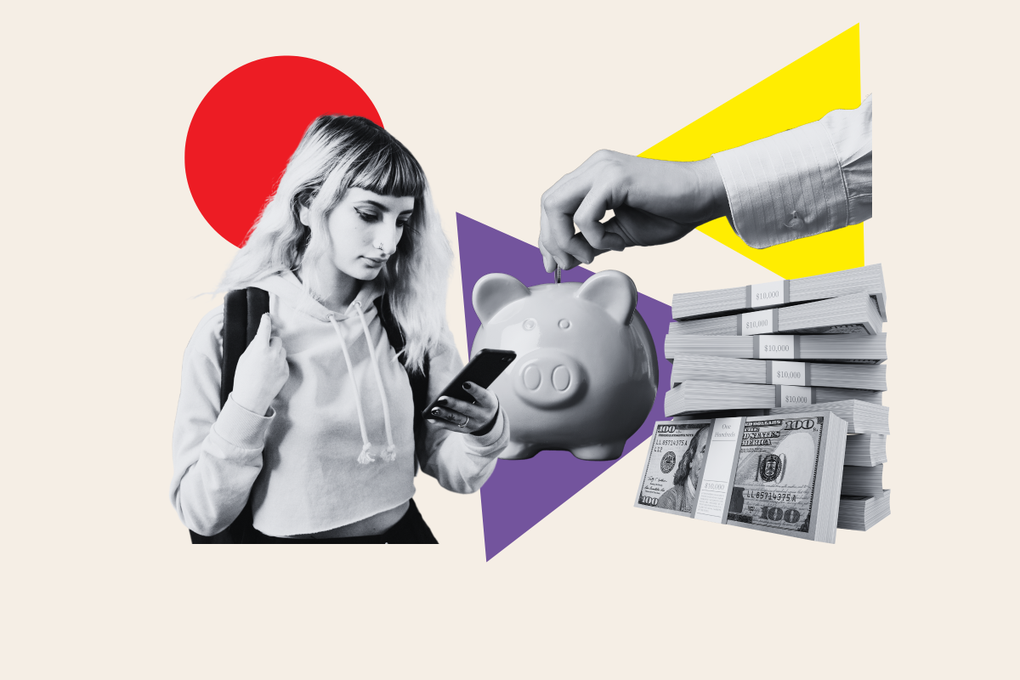The 'anxious generation' is teaching us how to save money
When people think of Gen Z (those born between 1997 and 2012), they often picture a generation that surfs TikTok, follows trends, and spends on experiences. But behind that facade lies a surprising reality: they may be the smartest and most practical savers in decades.
Growing up amid a series of crises, from the recession , a global pandemic, hyperinflation to the immense pressure of student debt and escalating living costs, Gen Z has learned early on that financial stability cannot be taken for granted. They cannot rely on the safe paths that previous generations have taken, but instead, they have equipped themselves with a whole new set of financial tools.
“Gen Z is becoming incredibly good at saving, largely because of the volatile environment they’ve grown up in,” said Brennan Thiergartner, a financial planner at Fidato Wealth. “Headlines about inflation and skyrocketing housing costs have been etched into their minds, making them more cautious with every penny they earn.”
As the first “digital native” generation, Gen Z has a distinct advantage when it comes to leveraging technology. Digital banking, fintech apps, and the endless wealth of financial knowledge on social media have shaped their flexible and effective money management mindset.
More importantly, Gen Z is breaking one of society’s biggest taboos: talking about money. They’re willing to share their salaries, investments, and financial failures with their friends and online communities. This transparency not only helps them learn from each other, but also creates a powerful wave of “financial awareness.”

Gen Z saves more money than any other generation (Photo: Getty).
Here are valuable lessons from Gen Z to build a more secure financial future.
6 "saving tips" of Gen Z that everyone needs to learn
Piggy Bank version 4.0
Remember the habit of putting change into piggy banks as a kid? Gen Z has "upgraded" this traditional method into a viral trend on TikTok and Instagram called "cash stuffing".
Instead of swiping their cards indiscriminately, they withdraw a certain amount of cash each month and divide it into envelopes or notebooks classified by category: food, travel, entertainment, shopping... The golden rule: when an envelope runs out of money, spending on that category must stop until the next paycheck.
This method may sound old-fashioned, but it is extremely effective in the digital age. It forces the practitioner to directly face their cash flow, feel the "pain" when money is running out, and thereby control spending in a tangible way.
Videos of people sorting money into beautifully decorated, leather-bound notebooks have turned a boring chore into a fun, inspiring ritual. Here's how Gen Z is turning financial discipline into a colorful, chill lifestyle.
"Virtual assistant" in your pocket: technology is your ally
If there's one thing Gen Z does better than any other generation, it's turning technology into a 24/7 personal financial assistant. They don't spend hours keeping records, instead, they let algorithms do the work for them.
By automating, Gen Z has removed the emotion and procrastination from the savings equation, ensuring a steady stream of money flowing toward their future goals.
Saving is a game: "Breaking" financial challenges
To stay motivated on the thorny financial path, Gen Z has turned saving into a game. Financial challenges are booming among millennials, from the extreme “No Buy Year” to the more relaxed 52-week challenge (saving an increasing amount each week).
The goal is to turn sacrifice and cutting back into a purposeful adventure with a clear beginning and end. Sharing your progress, achievements, and even your “weak moments” on social media creates a healthy competitive environment and great encouragement from the community. When you see thousands of other people “fighting” the same battle as you, saying no to a cup of milk tea or a fashion item suddenly becomes much easier.
"Loud budgeting": "Sorry, I'm saving money!"
Gen Z is known for being outspoken, and they apply that to financial management with a new concept: "loud budgeting."
Instead of making excuses like "I'm busy" to turn down an expensive dinner, they'll say, "I'll have to say no this time because I'm saving money for my emergency fund" or "My budget for going out this month is gone."
Loud budgeting isn't about being stingy. It's about making financial health a priority and normalizing conversations about money. When you make your goals public, you not only relieve pressure on yourself, but you also inspire those around you. Over time, expensive get-togethers can be replaced with free or less expensive activities, strengthening relationships without hurting anyone's wallet.
Hunting for "2-hand" items: Stylish, sustainable and super economical
Gen Z wardrobes are often a mix of fast fashion and secondhand finds. For them, buying secondhand is no longer a sign of deprivation, but a statement of style, smartness, and environmental awareness.
A 2024 Harris Poll survey found that 63% of Gen Zers have purchased used clothing or accessories, compared to the average of 47% of other age groups. From clothes to furniture to books, buying secondhand saves them a significant amount of money. What’s more, it reduces waste and gives them the opportunity to own unique, vintage items that mass-produced goods can’t.
"Side Hustle": When One Salary Is Never Enough
Gen Z understands that cutting back on spending is only one side of the equation. The other, equally important, side is increasing income. They refuse to be limited by a single source of income.
According to a survey by Self, a financial technology company, up to 81.9% of Gen Z said they have at least one side hustle. On average, a young person aged 18-24 can earn an additional $533 (more than 13 million VND) per month, equivalent to more than $6,400 a year.
The internet world has opened up countless opportunities: from freelancing (writing, designing, programming), online sales, creating content on YouTube, TikTok, to jobs in the sharing economy. These additional incomes not only help them cover their living expenses but also become an important source of capital to accelerate the speed of saving and investing.

Gen Z turns saving into a fun game with a series of financial challenges like not shopping for a year (Photo: iStock).
Gen Z’s strategies represent a profound shift in mindset: saving is not about being stingy or miserable, but about being proactive, smart, and empowered to take control of their future. They don’t wait for the economy to improve, they create their own stability.
Whether you're 20, 40, or 60, learning from this generation's flexible, open-minded, and tech-savvy financial mindset could be the key to successfully navigating an ever-changing financial world.
Source: https://dantri.com.vn/kinh-doanh/muon-thoat-ngheo-hoc-ngay-6-chieu-tiet-kiem-doc-la-ma-hieu-qua-tu-gen-z-20250905110348060.htm





![[Photo] High-ranking delegation of the Russian State Duma visits President Ho Chi Minh's Mausoleum](https://vphoto.vietnam.vn/thumb/1200x675/vietnam/resource/IMAGE/2025/9/28/c6dfd505d79b460a93752e48882e8f7e)
![[Photo] Joy on the new Phong Chau bridge](https://vphoto.vietnam.vn/thumb/1200x675/vietnam/resource/IMAGE/2025/9/28/b00322b29c8043fbb8b6844fdd6c78ea)
![[Photo] The 4th meeting of the Inter-Parliamentary Cooperation Committee between the National Assembly of Vietnam and the State Duma of Russia](https://vphoto.vietnam.vn/thumb/1200x675/vietnam/resource/IMAGE/2025/9/28/9f9e84a38675449aa9c08b391e153183)

























































































Comment (0)